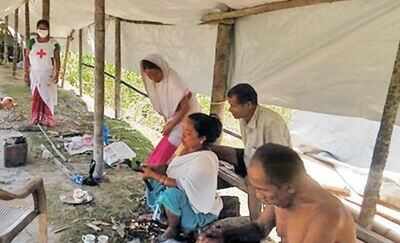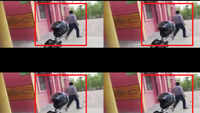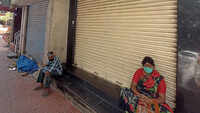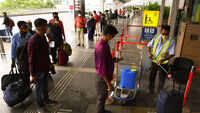
GUWAHATI: While social distancing norms have gone for a toss in the flood relief camps in many parts of the state due to lack of space in the relief shelters, Indian Red Cross Society volunteers are putting in all-out efforts in the worst flood-affected areas in eastern Assam to segregate the families in tarpaulin tents to contain the spread of the virus.
In the worst-affected districts like Majuli and Dhemaji, some of the people have preferred the Red Cross tents over going to the government relief camps. In the conventional relief camps set up by the district authorities, mostly in the schools, family-wise demarcation of space is not being done due to the space constraints. Nevertheless, the Red Cross volunteers have put in a herculean effort to set up tents for each family in some of the remotest flood-hit areas where the rural villagers have lost everything in the devastating first wave of floods.
In Majuli's Dakshin Ahatguri, the Namati and Naomari villages were washed away during the recent spate of floods by June 11, as erosion started wreaking havoc in the two villages which comprise a mixed population including the Mishing tribal families. They have been residing in the riverine island for ages.
However, the local volunteers from the Indian Red Cross Society (IRCS) stationed in the area swung into action overnight on June 11 to make arrangements for their safe stay, with social distancing their first priority. "In the present set-up of conventional relief camps, it's very difficult to maintain social distancing. The Red Cross volunteers, however, materialized the plan to earmark tarpaulin tents for each family so that social distancing can be maintained," said Naren Hazarika, a leading volunteer of the IRCS in Majuli.
For the villagers of Dakshin Ahatguri, the nearest government hospital is in Dergaon in nearby Golaghat district (about 13 km away). Even ambulances cannot reach the area during the rainy season. The loss of work at the paddy field is their biggest worry, as the families are heavily dependent on daily agricultural activities and fishing for their livelihood.
"We are facing a dual challenge this time. While our lands are being washed away, posing a threat to our existence, we are fighting Covid-19. Better healthcare is a distant dream for us," said Bhumidhar Bhuyan, a camp inmate.
General secretary of IRCS's Assam State Branch, Diganta Bujarbaruah said, "We realized that the challenge is going to be different this time. That's why separate demarcated spaces for different families was on our agenda so that the people feel at home even in distress."
In the worst-affected districts like Majuli and Dhemaji, some of the people have preferred the Red Cross tents over going to the government relief camps. In the conventional relief camps set up by the district authorities, mostly in the schools, family-wise demarcation of space is not being done due to the space constraints. Nevertheless, the Red Cross volunteers have put in a herculean effort to set up tents for each family in some of the remotest flood-hit areas where the rural villagers have lost everything in the devastating first wave of floods.
In Majuli's Dakshin Ahatguri, the Namati and Naomari villages were washed away during the recent spate of floods by June 11, as erosion started wreaking havoc in the two villages which comprise a mixed population including the Mishing tribal families. They have been residing in the riverine island for ages.
However, the local volunteers from the Indian Red Cross Society (IRCS) stationed in the area swung into action overnight on June 11 to make arrangements for their safe stay, with social distancing their first priority. "In the present set-up of conventional relief camps, it's very difficult to maintain social distancing. The Red Cross volunteers, however, materialized the plan to earmark tarpaulin tents for each family so that social distancing can be maintained," said Naren Hazarika, a leading volunteer of the IRCS in Majuli.
For the villagers of Dakshin Ahatguri, the nearest government hospital is in Dergaon in nearby Golaghat district (about 13 km away). Even ambulances cannot reach the area during the rainy season. The loss of work at the paddy field is their biggest worry, as the families are heavily dependent on daily agricultural activities and fishing for their livelihood.
"We are facing a dual challenge this time. While our lands are being washed away, posing a threat to our existence, we are fighting Covid-19. Better healthcare is a distant dream for us," said Bhumidhar Bhuyan, a camp inmate.
General secretary of IRCS's Assam State Branch, Diganta Bujarbaruah said, "We realized that the challenge is going to be different this time. That's why separate demarcated spaces for different families was on our agenda so that the people feel at home even in distress."

Coronavirus outbreak
Trending Topics
LATEST VIDEOS
City
 Shocking: Son bangs on the doors of a hospital in UP, but no one opens the door; accident victim dies
Shocking: Son bangs on the doors of a hospital in UP, but no one opens the door; accident victim dies  Covid-19 crisis: Complete lockdown from Saturday 8pm to 5am on Monday in Bengaluru
Covid-19 crisis: Complete lockdown from Saturday 8pm to 5am on Monday in Bengaluru  Pune man dons mask made of gold worth almost Rs 3 lakh
Pune man dons mask made of gold worth almost Rs 3 lakh  Covid-19: Kolkata stops flights from six major cities including Delhi between July 6 and 19
Covid-19: Kolkata stops flights from six major cities including Delhi between July 6 and 19
More from TOI
Navbharat Times
Featured Today in Travel
Quick Links
Kerala Coronavirus Helpline NumberHaryana Coronavirus Helpline NumberUP Coronavirus Helpline NumberBareilly NewsBhopal NewsCoronavirus in DelhiCoronavirus in HyderabadCoronavirus in IndiaCoronavirus symptomsCoronavirusRajasthan Coronavirus Helpline NumberAditya ThackerayShiv SenaFire in MumbaiAP Coronavirus Helpline NumberArvind KejriwalJammu Kashmir Coronavirus Helpline NumberSrinagar encounter
Get the app



